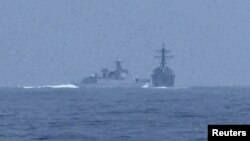The United States has been an Indo-Pacific power for over two centuries. Its treaty alliances with Indo-Pacific nations, such as Australia, Japan, and the Republic of Korea, stretch back 70 or more years; economic and people-to-people ties go even further back, noted Deputy Secretary of State Kurt Campbell.
“But efforts to step up our ambition from this strong foundation have too often proved episodic — a platform that has bred conventional wisdom that U.S. momentum in the Indo-Pacific lasts only until the next crisis elsewhere pulls our focus away from these strong and important endeavors,” he said.
Deputy Secretary Campbell asserts that is no longer true:
“Today, the structure of our Indo-Pacific engagement is durable, anchoring the United States in the region for the long haul. The best proof of that durability is very recent history. As wars rage in Central Europe, in the Middle East, our commitment to the Indo-Pacific has withstood those tests of resolve and focus.”
During the Biden administration, three fundamentals have grounded an enduring approach to the region, he said. First, is the realization that engagement in the Indo-Pacific has a clear strategic focus: it is home to more than half of the world’s population; its economies drive more than 60% of all global growth and are the world’s hub for trade, manufacturing and innovation.
“At the same time, the region is a source of significant risk. The PRC’s military buildup, which, we’ve already heard about, the biggest ever undertaken in peacetime, is upsetting the regional balance,” said Secretary Campbell. “What happens in the region will affect all Americans and the people of many or our allies and partners around the world.”
The second fundamental is that the U.S. “is not fighting alone,” said Secretary Campbell. Now, partnerships like AUKUS, the Quad, agreements between the United States, Japan and the Republic of Korea make up “unique constellations,” Deputy Secretary Campbell said, allowing “the United States to move faster, reduce the risk of veto players, root itself in the region, and share burdens.”
The third fundamental that ensures enduring U.S. engagement is the bi-partisan commitment to the American strategy shown by the U.S. Congress.
Both domestically and internationally, Deputy Secretary Campbell declared, “We have sustained U.S. engagement by expanding the array of stakeholders committed to a free and open Indo-Pacific.”














